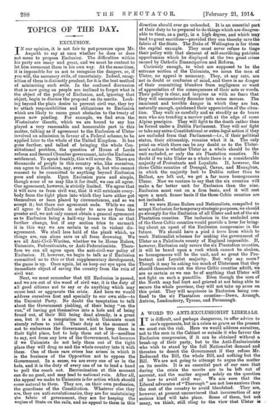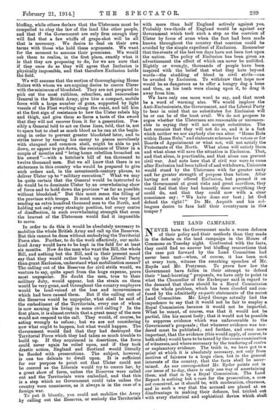A WORD TO ANTI-EXCLUSIONIST LIBERALS.
IT is difficult, and perhaps dangerous, to offer advice to one's opponents, but in a crisis so grave as the present we must run the risk. Here we would address ourselves, not to the men in the Cabinet or outside it who favour the Exclusion compromise, if it can be obtained without a, break-up of their party, but to the Anti-Exclusionists who wish to stand by the full Nationalist demand and threaten to desert the Government if they refuse Mr. Redmond the Bill, the whole Bill, and nothing but the Bill. We are not going to attempt to argue the matter on its merits. It is an essential part of our case that during the crisis the merits are to be left out of account, and the matter argued solely on the question of bow to avoid civil war. We are sure that the Liberal advocates of "Thorough" are not less anxious than the rest of the country to avoid bloodshed. They are, however, at present unconvinced that insurrection of any serious kind will take place. Some of them, but not many, we think, still cling to the view- that Ulster its
bluffing, while others declare that the Ulstermen must be compelled to obey the law of the land like other people, and that if the Government are only firm enough they will find that a few whiffs of grape-shot will be all that is necessary. We desire to deal on their own terms with those who hold these arguments. We want for the moment to assume their premisses. We would ask them to realize, in the first place, exactly what it is that they are proposing to do, for we are sure that if they once do so they will agree that Inclusion is physically impossible, and that therefore Exclusion holds the field.
We will assume that the section of thoroughgoing Home Rulers with whom we are arguing desire to coerce Ulster with the minimum of bloodshed. They are not prepared to pick out the most ruthless, relentless, and remorseless General in the British Army, give him a compact, mobile force with a large number of guns, supported by light vessels of the Fleet working along the coast, and tell him at the first sign of resistance to hew the Ulster rebels hip and thigh, and give them so fierce a taste of the sword that they will not recover from it for a generation. Pos- sibly a General told to act on these lines, told, that is, not to spare but to shed as much blood as he can at the begin- ning in order to prevent greater bloodshed later, and to strike terror by tearing his enemy to pieces mercilessly with shrapnel and common shell, might be able to put down, or appear to put down, the resistance of Ulster in a couple of months and "bring home rebellion broached on his sword "—with a butcher's bill of ten thousand to twelve thousand men. But we all know that there is no statesman in this country who would be prepared to give such orders and, in the seventeenth-century phrase, to deliver Ulster up to "military execution." What we may be quite certain that the General would be instructed to do would be to dominate Ulster by an overwhelming show of force and to hold down the province "as far as possible without bloodshed." But this must mean the filling of the province with troops. It must mean at the very least sending an extra hundred thousand men to the North, and holding not only every strategic position, but every centre
i of disaffection, n such overwhelming strength that even the bravest of the Ulstermen would find it impossible to move.
In order to do this it would be absolutely necessary to mobilize the whole British Army and call up the Reserves. But this cannot be done without embodying the Territorial Force also. Further, to do the work effectively, our mobi- lized Army would have to be kept in the field for at least six months. Now do the men who want the Bill, the whole Bill, and nothing but the Bill, and M. their present mood say that they would rather break up the Liberal Party than grant Exclusion, understand what mobilization means? The calling out of the Reserves for civil strife would, we venture to say, quite apart from the huge expense, prove most unpopular. No doubt the men, true to their military duty, would appear, but the strain on them would be very great, and throughout the country employers would be loud-voiced at the loss and inconvenience which had been caused them. But if the calling out of the Reserves would be unpopular, what shall be said of the embodiment of the Territorials, every one of whom is now earning his living in some civil calling ? In the first place, it is almost certain that a great many of the men would not respond to the call. They would, of course, be acting wrongly to refuse; but we are not considering now what ought to happen, but what would happen. The Government would find that they had destroyed the Territorial Force which they had taken so much trouble to build up. If they acquiesced in desertions, the force could never again be relied upon, and if they took drastic action, England and Scotland would literally be flooded with prosecutions. The subject, however, is one too delicate to dwell upon. It is sufficient for our purpose to point out that Ulster could not be coerced as the Liberals would try to coerce her, by a great show of force, unless the Reserves were called out and the Territorials were embodied, and that this is a step which no Government could take unless the country were unanimous, as it always is in the case of a foreign war.
To put it bluntly, you could not mobilize the Army by calling out the Reserves, or embody the Territorials
with more than half England actively against you. Probably two-thirds of England would be against any Government which took such a step as the coercion of Ulster by force of arms when the fact had been made known throughout the country that coercion could be avoided by the simple expedient of Exclusion. Remember that the events of the last ten days have not been lost upon the nation. The policy of Exclusion has been given an advertisement the effect of which can never be nullified. Rightly or wrongly, thousands of people have been inspired with the belief that what they hate beyond words—the shedding of blood in civil strife—can be avoided by Exclusion. To withdraw that hope now would be as dangerous as to offer a hungry dog a bone and then, as his teeth were closing upon it, to drag it away from him. We have only one more word to say, and that must be & word of warning also. We would implore the Anti-Exclusionists, the Government, and the Liberal Party to bear in mind that no substitutes for Exclusion will be or can be of the least avail. We do not propose to argue whether the Ulstermen are reasonable or unreason- able in saying they will not accept substitutes. The fact remains that they will not do so, and it is a fact which neither we nor anybody else can alter. "Home Rule within Horne Rule," and elaborate schemes for vetoes or for Boards of Appointment or what not, will not satisfy the Protestants of the North. What alone will satisfy them and what alone will save the situation is Exclusion. That, and that alone, is practicable, and that alone can prevent civil war. And note here that if civil war were to come after Exclusion had been talked of and withdrawn, Unionists would stand by the Ulstermen with far greater unity and far greater strength of purpose than before. After having not only offered Exclusion, but pressed it on the Government at great risks and great sacrifices, they would feel that they had honestly done everything they could do, and that they could now with a clear conscience say "We have done our best ; let God defend the right!" Do Mr. Asquith and his col- leagues desire to face half their countrymen in this temper ?















































 Previous page
Previous page